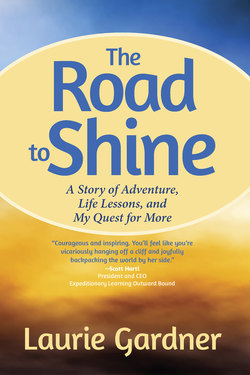Читать книгу The Road to Shine - Laurie Gardner - Страница 10
На сайте Литреса книга снята с продажи.
ОглавлениеINTRODUCTION
Virtually every country has an expression that means, “Life is short; don’t waste it.”
“Wasted time makes the saints cry.” (Guatemala)
“Eat and drink for tomorrow we die.” (Israel)
“Life is found in taking the opportunity.” (China)
And, popular among the US social media crowd:
“YOLO” (“You Only Live Once”).
Since we all seem to agree that life is a precious gift, why do so many people settle for less? Too many work in jobs they don’t like, stay in unfulfilling relationships, live where they don’t feel at home, and maintain less-than-ideal health. Others feel content in many ways, but still sense that something’s missing.
Many of us know the expression “hiding your light under a bushel,” yet we’re often unaware when we’re doing it ourselves. Even if you don’t realize you’re keeping yourself small, deep down you know when you’re not really happy. Maybe you’re feeling depleted or detached around your loved ones. Perhaps you’re bored or overextended at work. Maybe you’ve never felt settled where you live, or you generally feel that something’s not quite right. Chances are, if you’re picking up a book called The Road to Shine, some part of you knows there’s more to life than what you’ve been living.
How do we define happiness anyway? For me, it’s not a temporary state, like when we drink a glass of wine or win a prize and feel good in the moment but then go back to a crappy life. True happiness is the deep, existential contentment that arises when our outer world matches who we are internally; in other words, when what we’re doing, who we’re with, and how we’re being in the world reflects who we really are. When the two worlds match, happiness can sometimes be experienced as elation and euphoria, at other times as a grounded sense of peace. The key is that it lasts; it’s on our soul level, not just a passing mood or feeling.
When our inner and outer worlds match, we’re maximizing our authentic selves, “being all we can be.” In the words of humanist psychologist Abraham Maslow, we’re fully “self-actualizing.”
But how can we stop settling for less and start making the most of our lives?
This was my burning question as I sat high on a desert cliff one blistering summer seven years ago. While fasting alone on a vision quest for four days, a book came pouring out into my leather journal, outlining three steps to living more fully:
1. Uncover and heal your lack of self-love.
2. Discover or remember your passion and purpose.
3. Find the courage to shine.
As I looked back at my own life, I realized that these steps must be gone through in order. You can’t jump right to living your passion if you haven’t first cleaned up the deeper stuff that’s holding you back.
I understood that these words not only represented the stages of my own path, but that they could also guide others. As my desert download continued, I expanded the steps into a three-part road map, adding landmarks and practical tips to move through each stage. The message was straightforward: If you follow this, you’ll be much happier. If you don’t, your life will continue to feel flat.
Shortly after returning from my vision quest, a major New York publisher expressed interest in what I’d written and urged me to share my personal journey through the three steps. Part of me wanted to respond (in my best Monty Python accent), “I’m not dead yet!” Weren’t memoirs written by people who had lived long lives and were practically dead? Either that, or by people who had done something pretty amazing to write about themselves at such a young age. But after my editor’s suggestion sunk in a little deeper, I decided that if writing a memoir could potentially help others, it was certainly worth a try.
So it is with great humility and tremendous gratitude that I offer this story of my own road to shine. I picked lessons and experiences that almost all of us go through in one form or another, sharing them with the hope that some pieces will resonate in just the right way to inspire others to find more fulfillment in their own lives. If, after reading this book, even one person concludes, “Well, if she could do it, so can I,” I will have accomplished my goal.
A word of caution: The road to shine is not for the faint of heart. The journey is fraught with brutal self-honesty leading to exhilarating transformation. It’s important to be patient with yourself; you’ll progress at whatever pace your unique expedition is meant to unfold. In the end, I don’t know of a single person who has regretted the trip.
Journey well, bright lights.
